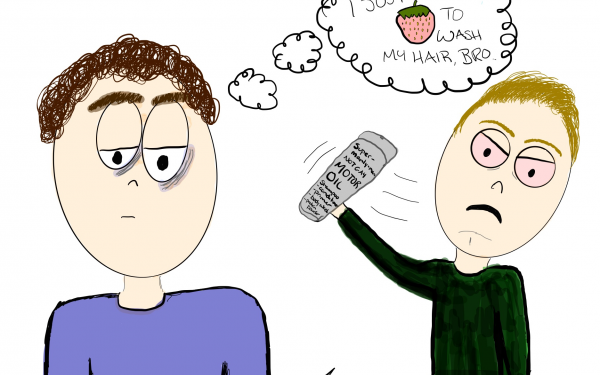Editorial: Genderqueer people deserve more than the minimum
Using identified pronouns is not enough
A Concordia Student Union councillor has misgendered another councillor on multiple occasions after repeatedly being reminded of their pronouns.
He also mocked pronouns in the CSU Facebook group, saying he identifies as male or female depending on the day of the month and suggesting a non-binary councillor use the pronoun “flying helicopter.”
To make matters worse, there was an audience of people and few called him out.
Using someone’s pronouns isn’t a complex idea. It’s as simple as calling someone by the name with which they introduce themselves. If someone told you their name, you would listen.
Yet, it isn’t only about acceptance of a person’s gender identity and pronouns. It needs to go much further than that.
It’s a shame so few CSU members acted out against this transphobic behaviour, but it is not an isolated incident. It is indicative of a climate surrounding queer advocacy in which individuals in the community are burdened with the responsibility of self-advocating while being targeted.
Not speaking out is taking advantage of your own privilege. Cisgender people can live their lives without giving gender advocacy a second thought, while non-binary and trans people are faced with microaggressions and other forms of violence daily.
Be better.
It’s time to tackle the heteronormative system many cisgender people live so comfortably in, but which can be so emotionally draining for others.
We must acknowledge that while our current mainstream perception of queerness can be liberating and affirming for some, it can exclude others. Our western perception of gender identity is based on a colonial system in which language itself reflects a rigid understanding of gender.
With many of us taking classes or even working over Zoom, it’s now easier than ever to identify our pronouns using profile names. We’re given the opportunity to normalize asking and telling each other how we identify.
During these tough times, a change in the way we treat genderqueer folks is even more crucial.
A study published by Statistics Canada in July showed that since physical distancing started, over 70 per cent of people who are genderqueer reported their mental health got somewhat to much worse.
Gender-diverse individuals reported symptoms of anxiety at much higher levels than those who identified as male or female. Additionally, genderqueer participants were almost twice as likely to report having lost their job.
Respecting pronouns is a prerequisite to creating safe and welcoming spaces for everyone. Those who intentionally make a mockery of people’s identities need to be called out and held accountable. We must all take responsibility for ensuring safety and equity for genderqueer people.
Editor’s Note: This article has been updated to remove the phrase “preferred pronouns” to reflect the fact that people’s identified pronouns are not a preference.


_600_832_s.png)



